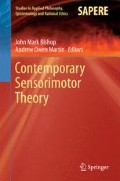Abstract
This paper explores whether the sensorimotor theory of perception (SMTP) might contribute to a de-intellectualized understanding of pretence. It applies SMTP to Currie’s [3], [4] notion of perceptual seeing-in that underlies the capacity to make imaginative transformations (seeing-as). This account bypasses manipulation of representational contents off-line, and argues that the relevant work might done by on-line, sensory imaginings stemming directly from perception. This novel position is supported with augmented theory of affordances and an account of directly perceived meaning. Ultimately, the paper proposes a less intellectualist approach than Currie’s to object-substitution pretend play of young children, setting the stage for an enactive theory of basic pretence.
Access this chapter
Tax calculation will be finalised at checkout
Purchases are for personal use only
Preview
Unable to display preview. Download preview PDF.
References
Chemero, A.: Radical Embodied Cognitive Science. MIT Press, Cambridge (2009)
Costall, A., Dreier, O.: Doing Things with Things: The Design and Use of Everyday Objects. Irish Journal of Sociology 17(2), 791–6035 (2006) ISSN 0791-6035
Currie, G.: Arts and Minds. Oxford University Press, Oxford (2004)
Currie, G.: Rationality, decentring, and the evidence for pretence in non-human animals. In: Hurley, S., Nudds, M. (eds.) Rational Animals?. Oxford University Press, Oxford (2006)
Currie, G., Ravenscroft, I.: Recreative Minds: Imagination in Philosophy and Psychology. Oxford University Press, New York (2002)
De Jaegher, H., Di Paolo, E.: Participatory Sense-Making: An enactive approach to social cognition. Phenomenology and the Cognitive Sciences 6(4), 485–507 (2007)
Gibson, J.J.: The Ecological Approach to Visual Perception. Houghton Mifflin, Boston (1979)
Harris, P., Kavanaugh, D.: Young Children’s Understanding of Pretense. Society for Research in Child Development, Monograph, vol. 58. University of Chicago Press, Chicago (1993)
Huttenlocher, J., Higgins, E.T.: Issues in the study of symbolic development. In: Collins, W. (ed.) Minnesota Symposia on Child Psychology, vol. 11, pp. 98–140. Erlbaum, Hillsdale (1978)
Hutto, D.D., Myin, E.: Radicalizing Enactivism: Basic Minds without Content. MIT Press, Cambridge (2013)
Leslie, A.: Pretense and representation: The origins of “theory of mind”. Psychological Review 94, 412–426 (1987)
Liao, S., Gendler, T.: Pretence and Imagination. WIREs Cognitive Science (online publication) (2010)
Lillard, A.: Making sense of pretense. In: Lewis, C., Mitchell, P. (eds.) Children’s Early Understanding of Mind: Origins and Development. Lawrence Erlbaum Associates, Hillsdale (1994)
Merleau-Ponty, M.: The Phenomenology of Perception. Routledge and Kegan Paul, London (1962)
Moro, C., Rodrıguez, C.: Production of signs and meaning-making process in triadic interaction at the prelinguistic level. A task for sociocultural analysis. The case of ostension. In: Abbey, E., Diriwachter, R. (eds.) Innovative Genesis: Microgenesis and the Constructive Mind, pp. 205–225. Information Age Publishing (2008)
Noë, A.: Action in Perception. MIT Press, Cambridge (2004)
Nichols, S., Stich, S.: Mindreading: An Integrated Account of Pretence, Self-Awarenessand Understanding of Other Minds. Oxford University Press, Oxford (2003)
O’Regan, J.K., Noë, A.: A sensorimotor account of vision and visual consciousness. Behavioral and Brain Sciences 24(5), 939–1031 (2001)
Rucinska, Z.: Pretence as Engagement in Unscripted Routines. Pending in Phenomenology and Cognitive Sciences, special issue on Narrativity
Sainsbury, R.M.: Fiction and Fictionalism. Routledge, London (2009)
Spaulding, S.: Embodied Cognition and Mindreading. Mind and Language 25, 119–140 (2010)
Vygotsky, L.S.: Mind in Society: The Development of Higher Psychological Processes. Harvard University Press, Mass (1978)
Author information
Authors and Affiliations
Corresponding author
Editor information
Editors and Affiliations
Rights and permissions
Copyright information
© 2014 Springer International Publishing Switzerland
About this paper
Cite this paper
Rucinska, Z. (2014). Basic Pretending as Sensorimotor Engagement?. In: Bishop, J., Martin, A. (eds) Contemporary Sensorimotor Theory. Studies in Applied Philosophy, Epistemology and Rational Ethics, vol 15. Springer, Cham. https://doi.org/10.1007/978-3-319-05107-9_12
Download citation
DOI: https://doi.org/10.1007/978-3-319-05107-9_12
Publisher Name: Springer, Cham
Print ISBN: 978-3-319-05106-2
Online ISBN: 978-3-319-05107-9
eBook Packages: EngineeringEngineering (R0)

